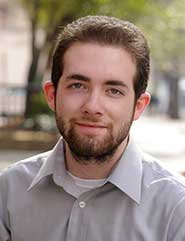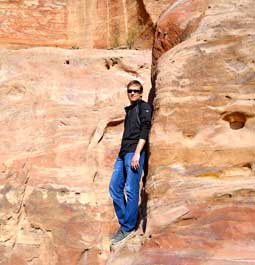Foreign Language Learning Opens Doors At Home and Abroad
By Meghan Davis
 From Spanish to Chinese to Arabic, UAB students are using their language skills to further diplomacy across the globe and to help businesses around the corner.
From Spanish to Chinese to Arabic, UAB students are using their language skills to further diplomacy across the globe and to help businesses around the corner.
“Society is changing rapidly and drastically,” says Lourdes Sánchez-López, Ph.D., associate professor of Spanish in the Department of Foreign Languages and Literatures. “Students prepare furiously for a globalized job market that is open to anyone in the world. Often, the decisive factor for an employer is the multi-linguistic and multicultural qualifications of applicants.”
Language Arts
Many students are attracted to languages for reasons beyond their resumes, of course. “I first enrolled in Chinese class because I was interested in the character-based writing system,” says junior Devin Thorne. “Writing characters is like drawing for me.” Thorne is one of the six UAB students who have won the U.S. State Department’s prestigious Critical Language Scholarship (CLS) in the past three years.
 Devin Thorne is one of six UAB students to win a prestigious Critical Language Scholarship from the U.S. State Department in recent years. Thanks to the scholarship, Thorne spent two months in Xi’an, a 3,000-year-old former Chinese capital, studying at Shaanxi Normal University with 30 CLS students. Picking up the subtleties of pronunciation and tonal changes remains challenging, Thorne says, but native speakers generally understand him, despite his Southern accent.
Devin Thorne is one of six UAB students to win a prestigious Critical Language Scholarship from the U.S. State Department in recent years. Thanks to the scholarship, Thorne spent two months in Xi’an, a 3,000-year-old former Chinese capital, studying at Shaanxi Normal University with 30 CLS students. Picking up the subtleties of pronunciation and tonal changes remains challenging, Thorne says, but native speakers generally understand him, despite his Southern accent.
On weekends he took excursions with Chinese friends, including a hiking trip away from the typical tourist destinations. After missing the bus back to Xi’an, Thorne’s group spent the night with a friend’s parents in a rural village. They ate rice porridge and slept on very hard beds, which the Chinese believe are better for the body. “I wondered if the floor might be more comfortable,” he says. “But I’m not complaining. I was thrilled to have such a unique opportunity.”
A Blizzard of Arabic
Senior Nicholas Price also developed a fascination with “foreign orthographies,” he says—Arabic calligraphy, in his case. “Since iconography is generally not allowed in Islam, the script is a way to creatively express their devotion,” Price says. Arabic script is “an artistic medium” as much as it is a form of communication, he explains.
The veteran language student has studied French and Russian and took a course in Czech during a semester abroad in Prague. But after a semester in Dubai as a William Jefferson Clinton Scholar, he still hasn’t taken a formal class in Arabic.
“I was unable to take the beginning class in Dubai,” Price says, “but after 10 days in a blizzard in Amman, Jordan, I was able to pick up on some of the language. It’s ‘Taxi Arabic,’ if you will.”
Both students plan to continue their language studies. Price anticipates further immersion in Arabic, French, and Russian, as well as using his individually designed major focusing on linguistics in film. “I’m fascinated by the emerging efforts of linguists and anthropologists to document endangered languages,” Price says.
Thorne hopes to return to China for graduate studies and a career in the U.S. Foreign Service. Someday, he says, he’d like to be the ambassador to China.
Communication Connections
 After spending a semester in Dubai as a Clinton Scholar, Nicholas Price has designed a major focusing on linguistics in film.
After spending a semester in Dubai as a Clinton Scholar, Nicholas Price has designed a major focusing on linguistics in film.
Sánchez-López emphasizes that students don’t need to leave Alabama to take advantage of their newfound language skills. “We receive frequent inquiries from individuals in the community wishing to learn occupational Spanish,” she says, explaining that requests for translation and interpretation assistance come from hospitals and clinics at UAB and elsewhere, government agencies, court services, and local businesses.
In response, the department developed the Spanish for Specific Purposes Certificate (SSPC), with Sánchez-López as director. UAB launched the program with an undergraduate certificate in 2007. Thirty-five students have completed the certificate, and 56 more are currently enrolled. Graduates use their language skills in a variety of fields, and many focus on serving the Hispanic community, says Sánchez-López.
“The SSPC coexists with the traditional major and minor programs in Spanish,” she explains. “It attempts to fulfill the needs of its dynamic, millennial students and of our increasingly diversified community.”